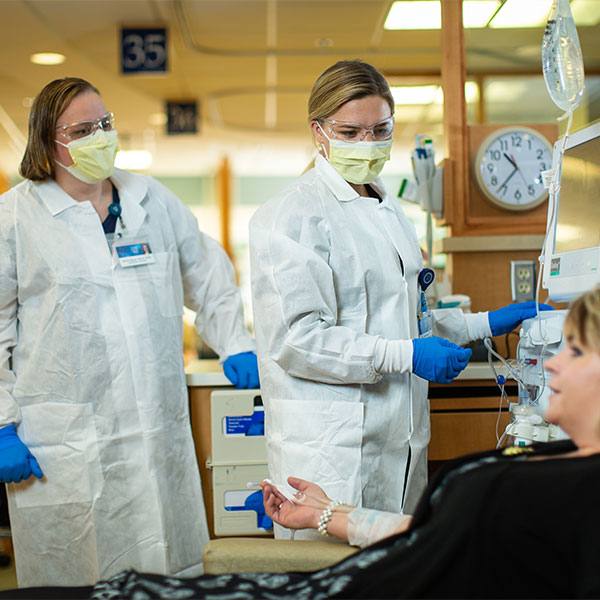-
Biotherapeutics
Regenerative Medicine Minnesota awards 7 research grants to Mayo investigators
Regenerative Medicine Minnesota, a statewide bipartisan initiative, has awarded seven research grants to Mayo Clinic to advance research and practice in the emerging field of regenerative sciences.
Established by Minnesota lawmakers, Regenerative Medicine Minnesota seeks to provide new health care options by advancing regenerative medicine into patient care across the state. Through a highly competitive process, Regenerative Medicine Minnesota has awarded over 180 grants totaling more than $30 million since 2014 in support of regenerative medicine, research and technology.
Regenerative medicine is an evolving area of practice that aspires to enrich care options by bringing cures to patients in need. The Mayo Clinic Center for Regenerative Medicine is at the forefront of this initiative.
In this newest 2021 funding cycle, Regenerative Medicine Minnesota awarded grants to Mayo Clinic for clinical trials and discovery and translational science research to improve care for conditions ranging across end stage kidney disease, alcoholic liver disease, neuromuscular disease, autoimmune diseases, obesity, spinal cord injury and debilitating joint arthrofibrosis, collectively recognized as areas of major unmet needs. This diverse disease target spectrum underscores the continuous development and growth of the regenerative toolkit.
Clinical trial awards
Sanjay Misra, M.D., $500,000 for Role and mechanism of function of adipose-derived mesenchymal stem cells in hemodialysis arteriovenous fistulas
This research seeks to develop therapies that would benefit patients with end-stage kidney disease who need an arteriovenous fistula, a connection between the artery and vein, for hemodialysis. Arteriovenous fistula provides the best vascular access for hemodialysis but will eventually fail due to narrowing of arteries over time. This grant funds early clinical trials in which mesenchymal stem cells derived from adipose (fat) tissue would be tested as a treatment to keep the arteriovenous fistula open for a longer period. The research also will assess whether mesenchymal stem cell therapy prevents scar tissue that leads to a narrowing of arteries.
Discovery science awards
Jason Doles, Ph.D., $250,000 for Targeting impaired myogenesis and muscle regeneration defects in GNE myopathy
Dr. Doles' team will utilize cell and animal models to develop and test possible therapies for GNE myopathy, a genetic neuromuscular disease that causes weakness, fatigue and disability. Currently, there is no treatment or cure for this life-altering disease.
Alfonso Eirin Massat, M.D., $250,000 for Role of mitochondria-related micro-RNAs in obesity-induced human MSC dysfunction
This research seeks to increase understanding of how obesity interferes with the ability of mesenchymal stem cell to restore form and function in diseased organs and tissues. At present, the mechanisms by which obesity damages mesenchymal stem cells and alters their regenerative potential are largely unknown. Dr. Eirin Massat's team will test whether obesity plays a role in altered expression of mitochondria-related microRNAs, blunting the ability of human mesenchymal stem cells to repair damaged kidneys.
Isobel Scarisbrick, Ph.D., $250,000 for Pharmacoregeneration for chronic spinal cord injury
The goal of this research is to develop a new treatment strategy for people with chronic spinal cord injury. Researchers will seek to contribute to new therapies that increase the electrical messaging between the brain and spinal cord that could restore function long after the injury. The research also will study whether new therapeutic strategies could bolster existing treatments that trigger neurological regeneration.
Translational research awards
Matthew Abdel, M.D., $250,000 for First-in-class pharmacotherapies for arthrofibrosis
Arthrofibrosis is a debilitating joint stiffening condition that affects approximately 5% of patients after total knee replacement. There are very limited therapeutic options. Most revolve around revision surgery in which some of the original prostheses are removed and replaced with new ones to try to improve function and relieve pain. This preclinical research will assess whether an existing Food and Drug Administration-approved drug could be repurposed and translated to modify stem cell behavior and heal fibrotic tissue that contributes to arthrofibrosis.
Enis Kostallari, Ph.D., $250,000 for Epigenetic inhibition of inflammation in alcoholic hepatitis
This research seeks to test the effect of a new therapy that might benefit people with alcoholic hepatitis, a severe liver disease that is a leading cause of death in the U.S. The research team will assess whether this therapy will prevent a buildup of white blood cells, known as neutrophils, that cause liver injury.
Elizabeth Siegler, Ph.D., $250,000 for Bioengineering of mesenchymal stromal cells for regenerative medicine
The goal of this research is to engineer mesenchymal stromal cells with enhanced immunosuppressive and regenerative properties as a potential therapy for autoimmune diseases. These engineered cells will be tested in preclinical models as a strategy to treat autoimmune diseases, such as ulcerative colitis and Crohn's disease.
Each of these research grant awards is active for a two-year period from 2021 through 2023. ###















